The Miniaturist - Adapting the Novel for ±«Óãtv One
John Brownlow
Writer
John Brownlow has adapted Jessie Burton's acclaimed best-selling historical novel for ±«Óãtv One for broadcast this Christmas. He explains how he met the challenge of translating the novel's unique qualities to the screen.

The Miniaturist: Otto (PAAPA ESSIEDU), Cornelia (HAYLEY SQUIRES), Nella Brandt (ANYA TAYLOR-JOY), Johannes Brandt (ALEX HASSELL), Marin Brandt (ROMOLA GARAI)(Image Credit: The Forge/±«Óãtv/ Laurence Cendrowicz)
According to you started out as a mathematician and have also worked as a computer programmer and rocket scientist! How did you move from that into scriptwriting?
I was a complete nerd at school and went to to study maths, which is how I ended up working on rockets and computers. But halfway through my degree I decided (crazily) that I wanted to study English, and despite only having a B-grade O-level, managed to persuade them to let me do that. After that I worked as a photographer's assistant, a production assistant and eventually landed a researcher job in documentary TV. I worked my way up to producer/director by my mid 30s, and that's when I made the switch into screenwriting.
What was your first professional writing work and how did you get this break?
I wrote my first screenplay the year I left university but just ended up putting it in a drawer for years (it was terrible, by the way). In my mid 30s I realized I had a lot of stories to tell from all the documentaries I'd made, and so I began writing. I wrote two and started sending them to agents, without much success. But I also entered them in the , and the second year I did this I placed fairly high. So I got on a plane to LA and camped out on a friend's floor and used a lawyer to get meetings with agents. I had a week of meetings and by the end of it I had several offers, and also managed to firm up a deal with the UK agent I'd been talking to.
My first pro job came shortly after that via her - it was a rewrite of a feature script about Christopher Marlowe for , the company run by Ewan McGregor and Jude Law. That was in 1999 I think, and I have been working pretty much continuously ever since then.
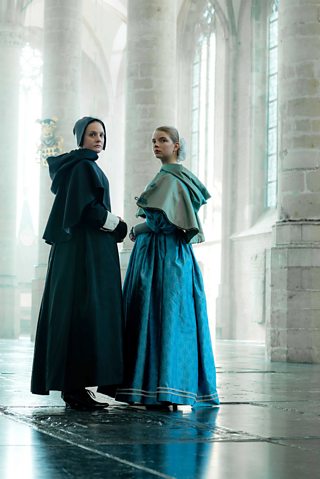
Marin (ROMOLA GARAI) , Nella Oortman (ANYA TAYLOR JOY) in The Miniaturist (Image credit: The Forge/±«Óãtv/ Laurence Cendrowicz)
How did you get involved with adapting The Miniaturist? Did you already know the book? Did you work with the author Jessie Burton on the adaptation?
, sent me the novel - which I didn't know at all - and immediately I knew I wanted to do it... the novel dripped with atmosphere and was beautifully written and researched, as well as completely original, but most importantly for me the story was constantly surprising and well-constructed (surprisingly rare in novels, even best-selling ones). That meant I was confident I could do it justice on TV. In these situations they usually send it to a bunch of writers so you know you're in a competitive situation, but I REALLY wanted to do it and I think passion always counts for a lot when you're pitching your take!
It was also obvious from the conversations with Kate that she was passionate, determined and as smart as a whip. As a writer, you're completely dependent on a producer to make things happen and ensure the quality of the final product as they are the person who will shepherd the whole process and fight all the battles that have to be fought. So having complete confidence in that person is a big factor, and I was delighted when she told me they'd like me to adapt it.
The book's author, Jessie Burton, and I skyped several times (I live in Canada) but we met for the first time on set. I know some writers don't like to work with the authors of the book they're adapting, but Jessie and I had (I hope) a real meeting of minds over it. I really admired how much thought she'd put into the jigsaw of the plot which made my life much easier (since TV is so plotty) and she was very funny as well, so it was a pleasure to put our heads together on it.
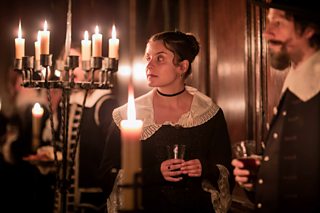
The novel's author Jessie Burton appears as an extra (Image Credit: The Forge/±«Óãtv/ Laurence Cendrowicz)
What were the particular challenges of adapting the novel? How do you retain the essence of the story in the different medium of a TV drama? What are its key themes?
As I say, it's a beautifully constructed story which meant that in some respects it was a very straightforward adaptation. The two biggest challenges were, as always, to externalize the thoughts and feelings of the protagonist, Nella - we can't read her mind, so we have to see actions and dialogue on screen which help us understand what's going on with her... but it can't be 'on the nose', so the challenge is to write something that is legible to the audience without telling them what to think.
The second challenge was the character of the Miniaturist, who for various reasons doesn’t really appear in the novel but we felt was an essential part of the contract with the audience for the TV series. So I had to do a lot of thinking about who that might be and why they would do the things they do.
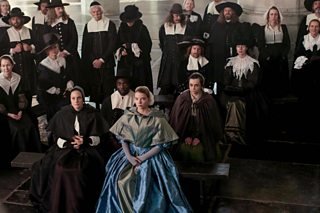
Marin Brandt (ROMOLA GARAI), Otto (PAAPA ESSIEDU), Nella Brandt (ANYA TAYLOR-JOY), Cornelia (HAYLEY SQUIRES), Frans Meermans (GEOFFREY STREATFEILD), Agnes Meermans (AISLIN McGUCKIN) (Image Credit: The Forge/±«Óãtv/ Laurence Cendrowicz)
What’s your working process? Do you map out the whole story arc before working on the details of each script?
I am a very strict outliner. My view is you don't build a house by just starting laying bricks - you draw up detailed plans for the foundation, the floors, the rooms, how they all connect, before you buy a single piece of wood or break ground. I always want to have a detailed roadmap before I start writing - so much so that I often say the writing is the easy part, really just adding dialogue and action, almost like colouring in. Obviously problems crop up as you're writing, but the aim is to keep them to a minimum. Once I have a detailed scene-by-scene outline, I do a 'vomit draft" where I just burn through the script as fast as I can without worrying about the quality of the writing. I can do 5-10 pages a day like this, so I have a first draft at the end of two weeks. I always feel like what I'm writing is terrible but when I come to read it again, it's always better than I thought (thank God). Then I do a series of passes on it until I find myself changing single words and then changing them back again. At that point I know I can't do any more on my own and I send it off to the producer.
Do you work with a Script Editor? How many people give you notes and how do you deal with these?
It varies from project to project, but in this case I worked almost entirely with the Executive Producer, Kate Sinclair, over a series of drafts. Her notes and vision for the project were essential and I'm in awe of how hard she fought to preserve what we both felt was essential about the project. Sometimes writers complain about getting notes but I enjoy it, and with Kate in particular I felt that her notes were continually elevating the project and prodding me to do better. So I always looked forward to her notes, which is not always the case!
Sometimes you get notes you hate. That's a fact of life. But I know from experience that the harder I react against a note, the more likely it is a week later I'll realize they were right. And even when a note is awful, it is usually motivated by a valid concern. So you try to work out the 'note behind the note', and in that way even an apparently awful note often turns out to be helpful. Writing is re-writing, that's the bottom line, and if you can't deal gracefully with notes, this is not going to be the industry for you!
I think the key thing is to remember that you aren't the script. A criticism of the script isn't a criticism of you.
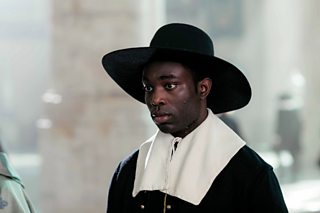
Otto (PAAPA ESSIEDU) (Image Credit: The Forge/±«Óãtv/ Laurence Cendrowicz)
The Miniaturist is set in a very distinctive and unfamiliar world – why do you think its story and characters are relevant and relatable to modern audiences?
It always comes down to relatability. Can we imagine ourselves in the same situation as the characters? Do we have experiences that allow us to understand how they are feeling and why they are acting as they do? In The Miniaturist we enter this unfamiliar word on the shoulders of a young woman entering the city of Amsterdam for the first time to begin a marriage with a man she hardly knows. That's a very easy person to identify with, and as she learns the new rules and secrets of this world we learn them with her.
The magic of Jessie's book (and of all great books, I think) is that it deals with universal themes - love, sex, greed, prejudice, hypocrisy, politics - within a unique setting, where the rules are subtly different to our own world, but similar enough for us to play along in our heads. What would I do in that situation? That's the key question you want the audience to be asking.
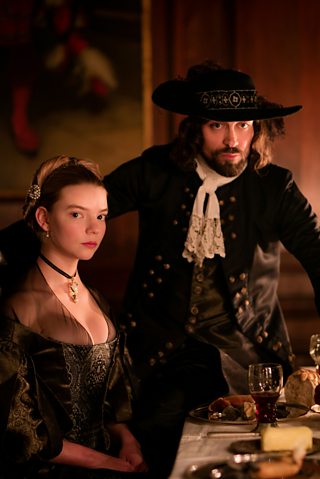
Nella Oortman (ANYA TAYLOR JOY) , Johannes Brant (ALEX HASSELL)(Image Credit: The Forge/±«Óãtv/ Laurence Cendrowicz)
Thinking of dramas like The Miniaturist and the recent adaptation of do you think stories of restrictive and controlling societies resonate right now?
Honestly, I think they always resonate! I think what is particularly relevant about these stories is that the vector into the story is a woman's perspective, and that they reveal how the domestic and the political are intimately related. The Miniaturist makes the house Nella lives in the locus of a titanic emotional and political struggle, so it's a miniature in a whole bunch of different senses.
Obviously, I'm a man, and that reflects how I write and see the world. But the fact that the book was written by a woman, and the Executive Producer Kate Sinclair is a woman, really kept me honest and forced me to view the world through a different lens from the one I might have used otherwise. That's one of the joys of adaptation - you get to live outside your skin for a while.
